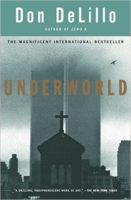
Underworld
by Don DeLillo
Sometimes I think everything I’ve done those years, everything around me in fact, I don’t know if you feel this way but everything is vaguely—what—fictitious.
•He wants me to go to the zoo because the animals are real. I told him these are zoo animals. These are animals that live in the Bronx. On television I can see animals in the rain forest or the desert. So which is real and which is fake, which made him laugh.
•To his surprise, Brian did not reject this theory. He didn’t necessarily believe it but he didn’t dismiss it either. He believed it provisionally here in this room located below street level in a framehouse on a weekday afternoon in Cliffside park, New Jersey. It was lyrically true as it emerged from Marvin Lundy’s mouth and reached Brian’s middle ear, unprovably true, remotely and inadmissably true but not completely unhistorical, not without some nuance of authentic inner narrative.
•In the dark he thinks about the game. The game comes rolling over him in a great warm wave of contented sleep. The game was lost and then they won. The game could not be won but they won it and it’s won forever. This is the thing they can never take away. It is the first thing he will think of in the morning and one part of him is already there even as he falls asleep, waking up to think about the game.
•This is a terrible moment, one of those times when Cotter realizes he has won a struggle he didn’t know was taking place. He has beat his father into surrender, into awful withdrawal.
•She looked at me and walked out of the room. I heard the shower running across the hall and I realized I’d done it all wrong. I should have brought up the subject standing in the doorway while she was watching TV. Then I could have been the one who walks out of the room.
•I noticed how people played at being executives while actually holding executive positions... You maintain a shifting distance between yourself and your job. There’s a sort of self-conscious space, a sense of formal play that is a sort of arrested panic, and maybe you show it in a forced gesture or a ritual clearing of the throat... but it’s not that you’re pretending to be someone else. You’re pretending to be exactly who you are.
•Famous people don’t want to be told that you have a quality in common with them. It makes them think there’s something crawling in their clothes.
•It’s the special skill of the adolescent to imagine the end of the world as an adjunct to his own discontent.
•He went out to get a pack of cigarettes and never came back. This is a thing you used to hear about disappearing men. It’s the final family mystery. All the mysteries of the family reach their culmination in the final passion of abandonment.
•...the way people modelled themselves on someone else, a few people, it’s only natural, mostly mimicking up, repeating a superior’s gestures or expressions.
•A man sat in a corner chair in a living room set with a coffee table in front of him and books or covers of books arrayed on the wall behind.
•I lived responsibly in the real. I didn’t accept this business of life as a fiction, or whatever Klara Sax had meant when she said that things had become unreal. History was not a matter of missing minutes on the tape. I did not stand helpless before it. I hewed to the texture of collected knowledge, took faith from the solid and availing stuff of our experience. Even if we believe that history is a workwheel powered by human blood—read the speeches of Mussolini—at least we’ve known the thing together. A single narrative sweep, not ten thousand wisps of disinformation.
•I watched TV in my motel.
•I found the more she talked the more she owed me. But I didn’t say a word.
•Broad and open like a summer waitress who says there you go when she deposits the food in front of you.
•He realized he’d forgotten to give his dad two glasses of water to take with the yellow and blue capsule despite the bold-faced reminder on the prescription bottle. These little failures ate away at his confidence even when he knew it was not his father’s fault for not managing his own intake or his mother’s for not being around when she was needed. There were constant little wars of whose fault is it and okay I’m sorry and I wish he’d die and get it over with, all taking place in Richard’s inner mind.
..






